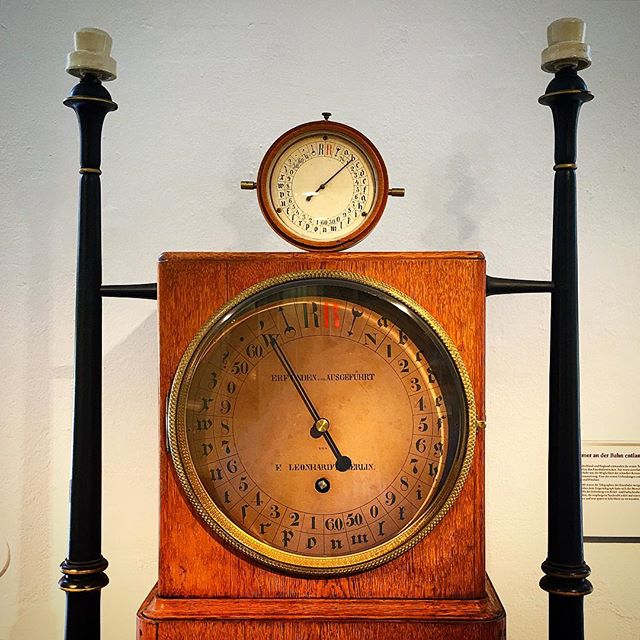 The history of clocks and calendars is that of a constant struggle to measure time with greater precision. Time and time again (so to speak), we arrive at a more accurate way to measure time, one more exact than the previous way. And over time (again please excuse the recursion) that time measurement system eventually shows some fatal weakness, exposed by either greater cultural or scientific demands of precision, or because of some inherent flaw that can no longer be ignored.
Click to Read More...
The history of clocks and calendars is that of a constant struggle to measure time with greater precision. Time and time again (so to speak), we arrive at a more accurate way to measure time, one more exact than the previous way. And over time (again please excuse the recursion) that time measurement system eventually shows some fatal weakness, exposed by either greater cultural or scientific demands of precision, or because of some inherent flaw that can no longer be ignored.
Click to Read More...
Technique
2016
Mon, 01 Aug 2016
Fri, 01 Jul 2016
 In almost each cell of the human body is a tiny molecular clock, made up by a set of protein gears. These gears play a role in almost every biological function, such as cuing body hunger and sleepiness, and even affecting cellular division and the aging process overall. Traditionally, it was thought the body had a master clock to synchronize time with all the cell clocks, called a suprachiasmatic nucleus (SCN), which has about 20,000 neurons, and resides in the brain.
Click to Read More...
In almost each cell of the human body is a tiny molecular clock, made up by a set of protein gears. These gears play a role in almost every biological function, such as cuing body hunger and sleepiness, and even affecting cellular division and the aging process overall. Traditionally, it was thought the body had a master clock to synchronize time with all the cell clocks, called a suprachiasmatic nucleus (SCN), which has about 20,000 neurons, and resides in the brain.
Click to Read More...
Wed, 01 Jun 2016
 Given that time can not be measured directly, one might suspect that it does not exist at all. An anti-time argument could almost work, too, except for the fact that this elusive entity provides a foundation for at least one basic law of physics, namely the second law of thermodynamics. Click to Read More...
Given that time can not be measured directly, one might suspect that it does not exist at all. An anti-time argument could almost work, too, except for the fact that this elusive entity provides a foundation for at least one basic law of physics, namely the second law of thermodynamics. Click to Read More...
Sun, 01 May 2016
 The upcoming month of December may seem a slightly longer than usual. Last week, the International Earth Rotation and Reference Systems Service has added a leap second at midnight, June 30. The problem, in short, is that the earth is not entirely consistent in its daily rotation, due to the dampening effect of tides and other factors. Click to Read More...
The upcoming month of December may seem a slightly longer than usual. Last week, the International Earth Rotation and Reference Systems Service has added a leap second at midnight, June 30. The problem, in short, is that the earth is not entirely consistent in its daily rotation, due to the dampening effect of tides and other factors. Click to Read More...
Fri, 01 Apr 2016
 The word time actually refers to two different abstract concepts. One is the length or duration of some event, such as That movie was over three hours long. The other is the period in time, as in That movie opened Friday. The date is a point within a larger set of cycles; The period is a select number of cycles. Click to Read More...
The word time actually refers to two different abstract concepts. One is the length or duration of some event, such as That movie was over three hours long. The other is the period in time, as in That movie opened Friday. The date is a point within a larger set of cycles; The period is a select number of cycles. Click to Read More...
Tue, 01 Mar 2016
 Here is how time works on computers, and on the networks connecting computers. Computers usually use two kinds of clocks. One is tied to the incoming voltage (110 in the U.S., 220 in Europe). Every voltage cycle causes an interrupt, either at 50 or 60 times per second. Another one is based on a crystal oscillator. Tension is applied to a piece of crystal in such a way that it emits a signal (usually between 5 million and 100 million times per second (or 5 to 100 Mhz). Click to Read More...
Here is how time works on computers, and on the networks connecting computers. Computers usually use two kinds of clocks. One is tied to the incoming voltage (110 in the U.S., 220 in Europe). Every voltage cycle causes an interrupt, either at 50 or 60 times per second. Another one is based on a crystal oscillator. Tension is applied to a piece of crystal in such a way that it emits a signal (usually between 5 million and 100 million times per second (or 5 to 100 Mhz). Click to Read More...
Mon, 01 Feb 2016
 We know each day on earth takes 24 hours. It is the time it takes the planet to make one complete rotation. But a day is not 24 hours exactly. In fact, the duration of a day only fluctuates around the time period of 24 hours. The length of a day varies for a number of reasons, and there are different time scales to account for all of variances. Some are based on the earth itself, and some are based on other stars.
Click to Read More...
We know each day on earth takes 24 hours. It is the time it takes the planet to make one complete rotation. But a day is not 24 hours exactly. In fact, the duration of a day only fluctuates around the time period of 24 hours. The length of a day varies for a number of reasons, and there are different time scales to account for all of variances. Some are based on the earth itself, and some are based on other stars.
Click to Read More...
Fri, 01 Jan 2016
 The history of time keeping is one of striving to tell the time in ever-more precise increments. We started measuring the passage of time in quarterly seasons, and now we measure it in billionths of a second. Improvements in time keeping drives human advancement; and human advancement
drives improvements in time keeping. The two dance together in the same way that electricity
and magnetism intermingle to form light. Click to Read More...
The history of time keeping is one of striving to tell the time in ever-more precise increments. We started measuring the passage of time in quarterly seasons, and now we measure it in billionths of a second. Improvements in time keeping drives human advancement; and human advancement
drives improvements in time keeping. The two dance together in the same way that electricity
and magnetism intermingle to form light. Click to Read More...
| 2014 | 2015 | 2016 | 2017 | 2018 | 2019 | 2020 | 2021 | 2022 | 2023 | 2024 |
|---|